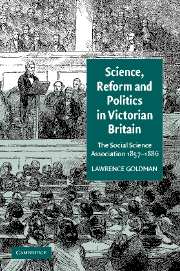Book contents
- Frontmatter
- Contents
- List of illustrations
- Acknowledgements
- Note on citations in the text
- List of abbreviations
- Introduction: the contexts of the Social Science Association
- Part I POLITICS
- Part II REFORM
- Part III SCIENCE
- Chapter 10 Social science in domestic context: popular science, sociology, and a ‘science of reform’
- Chapter 11 Social science in comparative international context
- Part IV DECLINE
- Conclusion: The Social Science Association and social knowledge
- Appendix I The founders of the Social Science Association, 29 July 1857
- Appendix II Social Science Association Congresses, 1857–1884
- Appendix III Presidents of the Social Science Congresses, 1857–1884
- Appendix IV Departmental presidents, 1857–1884
- Select bibliography
- Index
Chapter 10 - Social science in domestic context: popular science, sociology, and a ‘science of reform’
Published online by Cambridge University Press: 22 September 2009
- Frontmatter
- Contents
- List of illustrations
- Acknowledgements
- Note on citations in the text
- List of abbreviations
- Introduction: the contexts of the Social Science Association
- Part I POLITICS
- Part II REFORM
- Part III SCIENCE
- Chapter 10 Social science in domestic context: popular science, sociology, and a ‘science of reform’
- Chapter 11 Social science in comparative international context
- Part IV DECLINE
- Conclusion: The Social Science Association and social knowledge
- Appendix I The founders of the Social Science Association, 29 July 1857
- Appendix II Social Science Association Congresses, 1857–1884
- Appendix III Presidents of the Social Science Congresses, 1857–1884
- Appendix IV Departmental presidents, 1857–1884
- Select bibliography
- Index
Summary
In October 1857 the exiled French socialist Louis Blanc wrote to the Daily Telegraph to welcome the foundation of the Social Science Association and to assert that social science and socialism were identical: ‘socialism is nothing more than a sincere and scientific inquiry into matters which Lord Brougham declares to be eminently deserving of attentive study’. In the spring of 1883, Beatrice Potter (Beatrice Webb of the future) met for the first time Eleanor Marx, daughter of Karl Marx, in the tea room of the British Museum. Eleanor Marx explained that the ‘socialist programme was a deduction from social science, which was the most complicated of all sciences’. Beatrice Potter replied that political economy was ‘the only social science we English understood’. Yet she was soon to begin a series of experiences, including collaboration with Charles Booth in his early surveys of the Life and Labour of the People of London, which led her to reject ‘the self-contained science styled Political Economy, apart from the study of human behaviour in society – that is to say, of social institutions, or Sociology’. Her own contributions to social science were subsequently characterised by exhaustive empirical procedures in the analysis of social institutions in and through time. In Beatrice Webb's case, this form of social science led not to Marxian socialism but Fabian collectivism.
These anecdotes convey two things about nineteenth-century social science. First, there was intense interest in the construction of a social science but no agreement on its definition or form.
- Type
- Chapter
- Information
- Science, Reform, and Politics in Victorian BritainThe Social Science Association 1857–1886, pp. 293 - 320Publisher: Cambridge University PressPrint publication year: 2002



